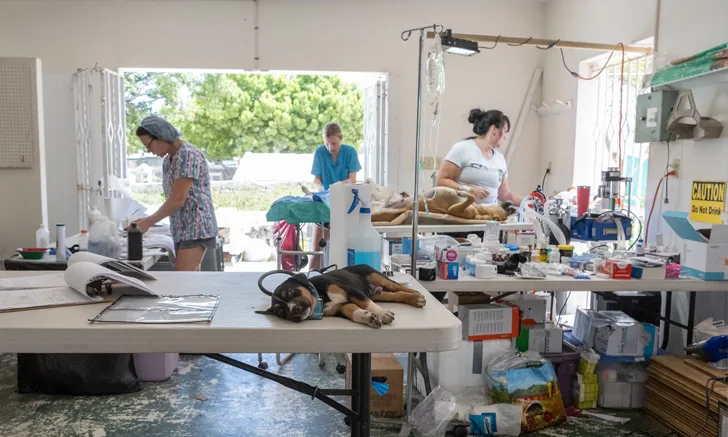
The volunteer surgery team works in an open-air building—no air-conditioning, but there is electricity.
With 32 years in practice, spays and neuters were routine procedures that anchored Susan Burkhart’s surgery-day schedule. But her perspective changed when a planned CE program in Turks & Caicos was canceled due to COVID and, instead, she volunteered to help neuter animals at the local SPCA.
Burkhart didn’t expect her visceral response to the countless dogs curled up on the beach—called ‘potcakes’ for scavenging the food that sticks to the bottom of cooking pans. Nor did she imagine she would start a nonprofit, 4 Leaf Rover, to make a difference in the lives of these animals.
A Starting Point
"I just didn't know there was such a huge overpopulation problem there and it made me really sad,” says Burkhart, a 1990 graduate of The Ohio State University and chief of staff at the Animal Medical Center of Ontario, in Ohio. “I came home and I couldn't sleep and I thought: I have got to do something about this. There are lots of problems in the world, but I know what to do about this problem.”
In the process of helping the island dogs and cats, Burkhart forged new connections with colleagues and her compassion for animals grew even deeper. “Figuring out how to care for these animals under these special circumstances has ignited my fire again, professionally,” says Burkhart.

More than 80% of dogs tested had heartworm disease, Burkhart estimates. And 80% of those dogs had tick-borne diseases, such as ehrlichiosis and anaplasmosis. Cats are also tested for heartworm, FELV and FIV.
"It just takes one person to start the ball rolling,” Burkhart says. “And so many people say, hey, I would love to do that, but just didn't know how to do it. If you have a way to help, or are even thinking about a way to help, just take the first step.”
Starting a Nonprofit, the DIY Way
As she raised money to return to the islands to hold a larger scale spay and neuter clinic, Burkhart thought people might be more comfortable donating to an organization where funds were tracked. Taking a DIY approach to “not spend a dime of donated money on paperwork,” she Googled all the steps required to create a new nonprofit, and 4 Leaf Rover became an official entity in January 2022.


The surgery recovery area is nicknamed "the beach."
A scrappy approach to fundraising—auctions at her veterinary clinic with donated items, a candle fundraiser, a donation box on the counter, and a GoFundMe webpage—has generated about $22,000 so far. Burkhart has also received donations from VetCor, the corporation to which she sold her practice several years ago, and from medical supply companies. While the islanders wel-comed Burkhart and her team with accommodations and “amazing meals,” Burkhart notes she is always scouting for new partnerships for equipment and supplies.
Changing the Bad Luck of Good Dogs
The work is both rewarding and heartbreaking, Burkhart says. On the island of Grand Turk, the surgery team, who acquired the appropriate licenses to perform surgeries locally, works in an open-air building (no air-conditioning, but there is electricity) while the “field team” drives around in golf carts, gathering strays and letting islanders know that free veterinary service is available. The teams are comprised of Burkhart’s friends, volunteers that heard about her efforts, and the island’s SPCA volunteers.

4 Leaf Rover works closely with local SPCA volunteers.
At the makeshift clinic, patients are induced with TTD (Telazol-Torbugesic-Dexdomitor), intubated, and maintained on isoflurane and oxygen. Surgical incisions are numbed and closed with subcuticular sutures and skin glue. Dogs receive injections of carprofen and penicillin G. The patients also get treated for parasites, ear or skin problems, and vaccinated against distemper, parvovirus, and rabies.
Know someone like Dr. Burkhart?
We want to feature them! Nominate your veterinary colleagues doing extraordinary work in the community. Fill out our submission form to nominate a veterinarian or veterinary team member here.
Every dog or cat they sterilize, vaccinate, and treat for parasites is a success story. But some animals cannot survive their severe cases of mange, heartworm, or other diseases. Burkhart recounts the story of a friendly white dog, nicknamed Luscious, that trotted through the makeshift clinic every day. When it was her turn to be spayed, the team discovered she had extensive TVT. While treatable in the US, it was not possible to adequately treat Luscious on the island, or to transport her to the US. There were no dry eyes among the team members when the dog was humanely euthanized, Burkhart says.
But she wants happier endings for these island dogs. 4 Leaf Rover’s mission is to change the bad luck of good dogs (and cats). “I just wanted to do something for those animals that would never be brought to a veterinarian, or didn't have owners,” she says.
“It really does take a village,” says Burkhart. “If we just work together—and our profession is pretty good at that—we could help a lot of animals before our time is up.”